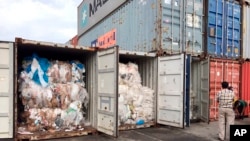PHNOM PENH, CAMBODIA — Cambodian authorities have announced plans to return 1,600 tons of plastic waste exported from the U.S. and Canada, according to a high-ranking official from the Environmental Ministry.
Inspectors found the waste Tuesday. It was packed in 83 containers unloaded in Sihanoukville, one of Cambodia's main ports.
Ministry of Environment spokesman Neth Pheaktra told VOA Khmer on Wednesday that "authorities are seeking the companies that smuggled the plastic waste in order to take legal action." He added that the waste would be returned "to the country of origin."
Neth Pheaktra said 70 of the containers were shipped from the U.S. and 13 came from Canada. Both countries are major waste exporters.
'Not a dustbin'
"Cambodia is not a dustbin where foreign countries can dispose of out-of-date e-waste, and the government also opposes any import of plastic waste and lubricants to be recycled in this country," said Neth Pheaktra.
In the past, Cambodian authorities have found radioactive and film waste arriving in Sihanoukville. He said the plastic waste found this week was not biodegradable.
Emily Zeeberg, spokeswoman for the U.S. Embassy in Cambodia, said the embassy "is monitoring reports of plastic waste at the Sihanoukville Autonomous Port."
Zeeberg added that "we have requested additional information and are offering U.S. government assistance to determine both the exporter (country of origin) and the importing entity here in Cambodia."
Sorn Chey, who works with the Affiliated Network for Social Accountability in East Asia and the Pacific, said the authorities should heed control mechanisms. "This is something that should not take place," he added.
Chinese project
Cambodia's rejection this week was the latest step in a trash crisis that emerged when China began Operation Green Fence in February 2013. It was aimed at reducing the vast amounts of contaminated recyclables and waste sent to China.
In January 2018, Beijing banned almost all imports of two dozen types of recyclable materials, such as plastics, mixed paper and electronic waste. Now, unless the materials are clean and sorted so they are unmixed, China rejects them.
Since then, other countries in Southeast Asia that accepted waste have started to turn it away. In May, Malaysia returned 450 tons of plastic waste to the U.S., the United Kingdom, Canada, Japan and the Netherlands. Earlier this month, Indonesia rejected waste from Australia.




